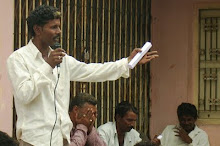Indian Express; KapilDave : Tuesday, July 26, 2011,
Gandhinagar : Quality checks jack up prices of salt produce by more than 400%
Research by Bhavnagar-based Central Salt & Marine Chemical Research Institute (CSMCRI) for salt quality improvement in Rajula taluka of Amreli district could change the economics for salt workers now.
Scientists and farmers who participated in an experiment shared the findings at the annual general meeting of the Gujarat Agariya Hit Rakshak Sangh on Sunday, detailing how quality checks could help them retain what they threw away as waste and also enable them to fetch a much higher price for their produce.
A group of 15 Agariyas and scientists of CSMCRI worked on creating model salt farms (Agar) with regular scientific quality checks and other inputs and they realised they could get five to six times of the prices they presently get for their salt produce.
Vasrambhai of Bherai village in Rajula taluka, while sharing his experience, said: “Generations of my family have been in this business, but we never knew that salt could fetch so much of money. We would sell common salt to traders for Rs 150-180 per tonne,” he said.
During the last season that ended in May this year, Vasrambhai sold his salt produce for Rs 650-875 per tonne.
In fact, Agariyas who have opted for CSMCRI’s model are being offered a Rs 1,250 per tonne of their produce from the next season.
Velabhai, another Agariya from Rajula, said the CSMCRI established a salt testing laboratory at a cost of Rs 2.83 lakh in his saltpan to remove impurities. And Velabhai has no regrets. “I have decided to do it now regularly,” he says.
Dr Ajay Bhatt, a senior scientist from CSMCRI who led the experiment with Rajula salt-pan workers, said it was aimed at quality improvement in mixed salt projects. “To date, they did not know the value of end waste, which has a high concentration of magnesium potash and other key chemicals like sulphate etc., which can easily fetch up to Rs 30,000 per tonne,” Bhatt said.
“We taught them how to produce A-grade mixed salt and separate common salt to be used for industrial purposes. By taking simple care, 15 Agariyas got four to six times more money in the very first season. Now, companies are offering more. We have decided to now experiment with 80 Agariyas in the upcoming season in different parts of the state since the different areas have different potential and require different processes for production,” said the scientist.
Agariyas dig in heels in Little Rann of Kutch;
Agariyas want recognition as farmers and an assurance that they have a right on Little Rann of Kutch (LRK) land.
In their Sunday meeting, they resolved to press for their right to work in LRK, which has been deemed a sanctuary area by the central government, barring making of salt.
Shantabhai Bhamamiya, an Agariya from the famous Kharaghoda saltpan area and a trustee in Agariya Hit Rakshak Manch, said, “If the government can waive debts of farmers, why can’t they help us in same way. If the government can fix minimum support prices for other farm produces, why not give us the same benefits and save us from exploitation.”
Narubhai Koli, an Agariya from Santalpur in Patan district, said: “Often, we face natural and man-made calamities in which our salt produce is washed off. Last year, heavy rains and sudden release of water from Narmada canals almost washed off our produce. We requested the state and central governments for giving us some package, but no one responded.”
Thakarsibhai Mahaliya from Kharaghoda said, “We have been producing salt in Little Rann of Kutch for generations. Suddenly, the government says it’s a sanctuary for wild ass and we cannot live here. Wild ass and we have lived together for generations without harming each other. The government cannot throw us out of Little Rann of Kutch.”
Pamkati Jog from Ahmedabad-based Agariya Heet Rakshak Manch, which has taken up the rights of salt-pan workers of Gujarat, said: “Even though state and central governments are now recognizing the unorganised traditional salt-pan workers and have started some welfare schemes, a lot still needs to be done for this community.”
















.jpg)
.jpg)
.jpg)
.jpg)













No comments:
Post a Comment